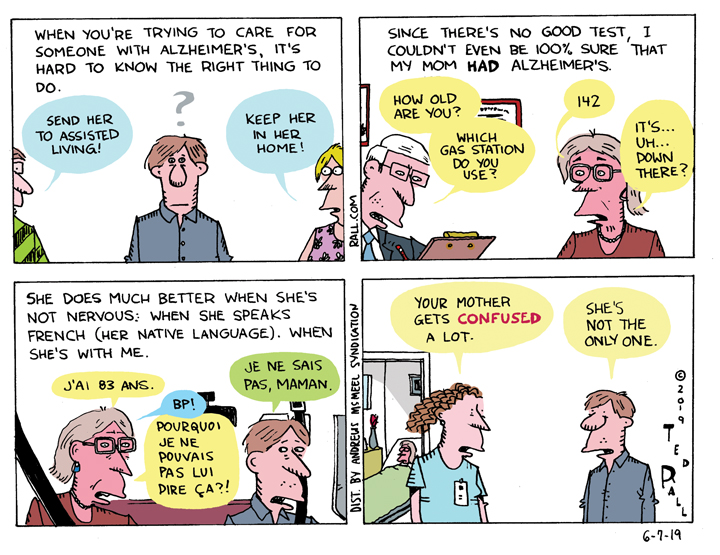Over the last few years, I have been the sole caregiver for my mother, who is suffering from Alzheimer’s disease. The word you keep hearing from professionals is that your loved one is “confused.” But they’re not the only one.
What Do You Do When You’re Caring For Someone with Alzheimer’s?


7 Comments. Leave new
Those who believe that the world is run by an omniscient, omnipotent, and, not least, benevolent divinity, have not had to care for patients with Alzheimer’s or other forms of dementia….
Henri
I witnessed my mother’s apparent disconnect from reality along with her uncanny ability to do crossword puzzles and Soduko.
Geriatricians often prescribe drugs that are new and not well-tested for interactions and produce symptoms of their own.
It’s hard to separate the original condition from drug side effects and illness progression.
Considering that these drugs are not cures, but provide only symptom relief at best, and that you know your parent and spend more time with her than her doctors will, you will have to judge the effectiveness of the drugs and continuation of their use.
My wife has had post herpetic neuralgia for years, and dealt with opiate induced hyperanalgesia (increased sensitivity to pain, in other words pain amplification) while the assholes in charge prevented use of marijuana derivatives.
She has now eliminated opiates entirely by use of CBDs instead.
Clarification:
“Considering that these drugs [for illnesses diagnosed as Alzheimer’s] are not cures…”
🙁
Tough call, would you rather die in your own bed or in some assisted living facility surrounded by strangers?
The consensus of the pros associated with my dad’s decline was that I should take him to a hospice. So I did. He died the next day, surrounded by strangers.
I’m not recommending this for anyone else but, so much of what I find of value in life is contingent on my independence from others and being out of the control of others, that for myself I choose death over disability.
I had a major surgery recently and was advised that I might die from the surgery, and I know of two others that recently did die from it, but I chose possible death before a long drawn out disability, and have had a great recovery and have gone back to hiking with a weighted backpack among my other activities.
I reject the premise that some nose-poking asshole has the right tell me that I have no right to choose the time of my demise just because it offends their sensibilities.
For some people I would not ask the cause of their death, but rather question the cause of their life.
As with (I suspect) any terminal illness, a lot of the stress comes from the well-intended, the ignorant, and the con artists. Every death is bespoke, but you’re being handed off-the-rack, mass-produced help and directions. You race into the hospital with the patient and are told to wait your turn by a surly piece of personnel who gives you a dirty look because you’re upset that your mother/father/brother/sister/wife/husband is sick and scared.
But here’s the reality of it. (And all of the following is from personal experience.)
No matter what you do, you’ll think there was something else, something more, you could have done. Some big-ticket “one day” item like a trip or something trivially simple like watching a particular movie. But that’s not the case. You can think it all you like, but it isn’t the case. You can do your best, and your best, whatever it is, will fail under the withering spotlight of your own self-recriminations. I suspect this is part of the mechanism for processing the anger and the sorrow. I don’t care how much of a saint a caregiver can be, when you replay the tape, you will dissect yourself into a full-blown monster.
Another thing almost no one talks about is what happens to the survivors when the death happens. In my case, when I saw the body for the first time, the very first emotion across the finish line (with sadness and regret a close second and third but not so close that I needed to go to the replay) was relief. Just enormous relief.
Harlan Ellison wrote a story about that kind of reaction, and one day while he was doing a radio interview, one of the callers was a young woman who was almost hysterical. She was calling because she’d cared for a very ill relative for years and when that relative had died, that was the reaction the caller had had–a huge sense of relief. And she’d felt guilty about it for such a long time until she’d read Ellison’s story because she’d thought all along that she was the only person who’d ever felt that way.
Death and dying in this country and in this time is a lot like life and living: made as hard as possible with a lot of petty, vindictive, greedy people waiting for every chance they can get to take a cheap swipe at you or your wallet as you go by. And contrary to the popular narrative, there’s no “right” way to mourn and there’s no right way to feel. It isn’t a bus schedule.
At least, that’s what I’ve learned along the way.